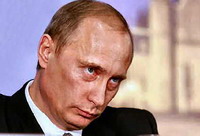Vladimir Putin to refuse presidential powers in role of prime minister
Vladimir Putin would not assume presidential powers after stepping down as Russian president.

"If someone thinks that I intend to move, let's say, into the government of the Russian Federation and transfer the fundamental powers there, that's not the case," he said at a news conference at the conclusion of an EU-Russian summit in Portugal.
"There will be no infringement on the powers of the president of the Russian Federation, at least while it depends on me."
Putin suggested earlier this month that he could become prime minister after his second presidential term ends in May, leading some to speculate that the substantial powers now invested in the presidency might be transferred to the prime minister.
After repeating his insistence that he does not intend to change the constitution in order to run for a third consecutive term, Putin said Friday that he had not yet decided where and in what capacity he would work after he leaves the presidency. He is expected to remain an influential figure in Russia.
Russia will hold parliamentary elections in December and a presidential vote three months later.
Putin will lead the ticket of the dominant United Russia party in the parliamentary elections. An overwhelming victory for the party could turn the legislature into a new power base for Putin and give him a claim to continued authority based on his popularity.
Subscribe to Pravda.Ru Telegram channel, Facebook, RSS!





